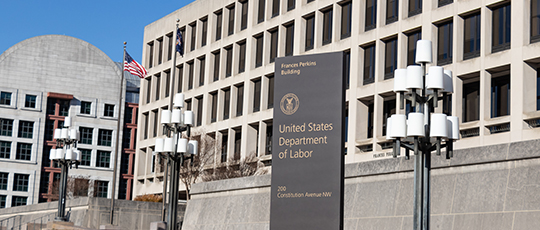For WorldatWork Members
- Engage Community, peer engagement and connection platform
- DEI Priorities Quick Poll, research
- Trends in DEI Practices and Policies, research
For Everyone
- Breaking Down Some of President Trump’s Initial Orders and Actions, Workspan Daily article
- The HR Horizon: Total Rewards Takeaways from the Recent U.S. Election, Workspan Daily article
- Driving DEI: Some Seek to Tap the Brakes, Others Press the Accelerator, Workspan Daily article
- Equity Remains Pivotal for HR, Organizations and the Workforce, Workspan Daily article
U.S. government departments and agencies have moved into response mode following President Donald Trump’s initial spree of executive orders, actions and memorandums.
Activity has been particularly brisk over the past two days around diversity, equity and inclusion (DEI) — or diversity, equity, inclusion and accessibility (DEIA), as it is (or was) referred to within internal U.S. government parlance. Specifically, that activity has been geared toward the dismantling of related programs, policies, offices and roles.
This article chronicles some of the actions taken to this point.
Information Removal on Internal Application of DEI
The U.S. government as an employer has a fairly long history of DEI programs and policies. Affirmative-action executive orders by President John F. Kennedy (10925) in 1961 and President Lyndon Johnson (11246) in 1965 are among the earliest and most significant.
However, much digital-format government information about historical or present-day programs and policies is no longer available. As of 5 p.m. EST on Wednesday, Jan. 22, outward-facing media (websites, social media accounts, etc.) related to internal DEI application has been (or is in the process of being) removed, as per the requirements of a memo sent to heads and acting heads of departments and agencies on Tuesday, Jan. 21, by Charles Ezell, the acting director of the U.S. Office of Personnel Management (OPM).
The “History of DE&I” page on the Department of Labor website now reads “Page Not Found,” as does the Office of Labor-Management Standards page on “Diversity, Equity, Inclusion and Accessibility”.
Executive Order 14035, “Diversity, Equity, Inclusion and Accessibility in the Federal Workforce,” enacted by President Joe Biden in June 2021, has been repealed and the webpage now lists a “404” message behind an image of the White House.
Shuttering Focused Offices and Roles
The Ezell memo, titled “Initial Guidance Regarding DEIA Executive Orders,” provided additional guidance to government entities on mobilizing actions from two of President Trump’s Jan. 20 executive orders — “Ending Radical and Wasteful Government DEI Programs” and “Initial Rescissions of Harmful Executive Orders and Actions”. In the DEI-focused executive order, Trump called out the Biden administration for propagating “illegal and immoral discrimination programs.”
“Steps to Close Agency DEIA Offices” was at the top of the memo’s to-do list. By 5 p.m. EST on Wednesday, Jan. 22, department/agency leaders were required to:
- Send an agency-wide notice to employees informing them of the closure.
- Send a notification to all DEIA office employees that they are being placed on paid administrative leave effective immediately as the agency begins closing/ending all DEIA initiatives, offices and programs.
- Deactivate all DEIA office websites, social media accounts, etc.
- Withdraw any final or pending documents, directives, orders, materials and equity plans issued in response to Executive Order 14035.
- Cancel any DEIA-related training.
- Cancel any work done with DEIA-related contractors.
By noon EST on Thursday, Jan. 23, department/agency heads were to provide a progress report to the OPM and include additional information on:
- Current DEIA office staffing (levels and names), and
- Current DEIA-related contracts and contractors.
By 5 p.m. EST on Friday, Jan. 31, department/agency heads need to provide the OPM:
- A written plan for executing a reduction-in-force action for employees who work in a DEIA office. An appendix within the Ezell memo stated DEIA employees targeted for force reduction and administrative leave will receive their full salary and benefits during the leave period.
- A list of all contract descriptions or personnel position descriptions that were “changed since November 5, 2024, to obscure their connection to [a] DEIA program.”
Targeting DEI Not Only in Name But in Deed
That last bullet point above is particularly interesting since it calls out formal efforts — by the OPM and, transitively, by and through the individual departments/agencies — to root out DEIA activities that are in place (or those that are or may be in transition) under the guise of another moniker.
Much of this is included in Appendix 1 to the Ezell memo, which stated, “We are aware of efforts by some in government to disguise these programs by using coded or imprecise language. If you are aware of a change in any contract description or personnel position description since November 5, 2024, to obscure the connection between the contract and DEIA or similar ideologies, please report all facts and circumstances to [a provided government email address] within 10 days. There will be no adverse consequences for timely reporting this information. However, failure to report this information within 10 days may result in adverse consequences.”
The appendix does not provide a list of “code” words or “imprecise” terms that are being — or could be — used to subvert the new vision and guidelines.
Reaction to the Federal Pullback
Reaction has been mixed to the federal government’s DEI/DEIA pullback.
The National Association for the Advancement of Colored People (NAACP), in a Jan. 22 post on its website, called the Trump administration’s anti-DEI bent “a significant regression from the previous administration’s approach to centering racial equity and remedying the systemic racism deeply entrenched in our nation’s governing practices.” The post also cited McKinsey research data that showed organizations with diverse workforces have a strategic advantage over those who don’t.
“This executive order threatens public services that benefit all Americans. ... Poor and working-class people will pay the price,” said NAACP president Derrick Johnson. “This is all part of a calculated strategy to redefine the role of government, privatize essential public services and further [discriminate].”
Christopher F. Rufo, a senior fellow at the Manhattan Institute, a public-policy think tank, provided a different viewpoint. In an article published in “urban policy magazine” City Journal, he stated: “Trump’s victory over Kamala Harris on November 5 sealed DEI’s fate. Corporate America, including companies such as Walmart and Meta, interpreted the event as an incentive to change, voluntarily terminating their DEI programs before Trump took office. ... The American people were wise enough to realize that their country might not have survived four or eight more years of government by DEI. They spoke on November 5, and now President Trump is acting accordingly.”
Sander van ’t Noordende, the CEO of recruitment firm Randstad, countered that statement in a Jan. 23 Forbes article: “Some businesses are rolling back on their equity-based programs, but most businesses I talk to are navigating and staying the course. Why? Because it’s good for business. The workplace should be a high-trust environment. Our research shows that less than half (49%) of talent trust their employers to create a working culture where everyone can thrive. Employers need to work on bringing this higher, and not putting that trust at risk.”
Editor’s Note: Additional Content
For more information and resources related to this article, see the pages below, which offer quick access to all WorldatWork content on these topics:








